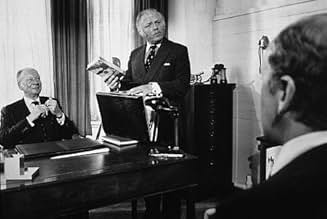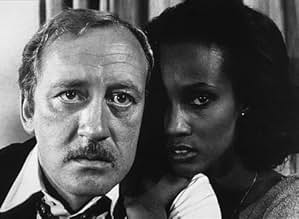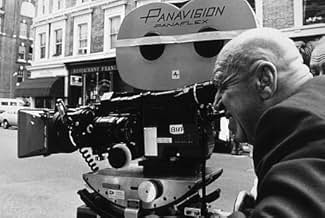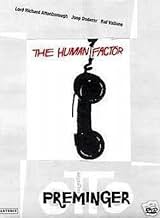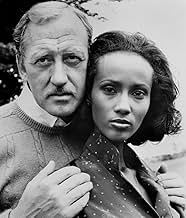VALUTAZIONE IMDb
6,1/10
1724
LA TUA VALUTAZIONE
Aggiungi una trama nella tua linguaWhen a leak of information in the African section of British Intelligence is discovered, security man Daintry is brought in to investigate.When a leak of information in the African section of British Intelligence is discovered, security man Daintry is brought in to investigate.When a leak of information in the African section of British Intelligence is discovered, security man Daintry is brought in to investigate.
- Regia
- Sceneggiatura
- Star
Recensioni in evidenza
After I had read this late Graham Greene novel years ago, I was immediately fascinated by its le Carré-like plot with very much Greene-like characters. I immediately thought that this should have been made into a movie.
Shortly afterwards, I learnt that Preminger had already made it into a film back in 1979, so I was of course very eager to see this movie. Yet - this film has fallen into oblivion, it is not commercially available and it is hardly ever on TV.
Very strange if you consider that it features a cast bristling with splendid British character actors (Nicol Williamson, Derek Jacobi, Robert Morley, Richard Attenborough, to name but a few) and has a screenplay by Tom Stoppard (which IMHO was a straightforward, enjoyable transfer of Greene's novel to the screen).
So, only yesterday did I have the opportunity to watch it on TV. Certainly, it is no cinematographic highlight: it is very low-key, very unfussily directed by Otto Preminger in a more than plain style, and has basically no "action" (but then - what would you expect of a Greene novel?). It might as well have been made for TV, but this impression may also be due to the serious budget problems while filming.
However, it has some splendid performances by actors whom I could watch all day long. The mere cast turns this film into a success and makes it worthwhile watching.
Shortly afterwards, I learnt that Preminger had already made it into a film back in 1979, so I was of course very eager to see this movie. Yet - this film has fallen into oblivion, it is not commercially available and it is hardly ever on TV.
Very strange if you consider that it features a cast bristling with splendid British character actors (Nicol Williamson, Derek Jacobi, Robert Morley, Richard Attenborough, to name but a few) and has a screenplay by Tom Stoppard (which IMHO was a straightforward, enjoyable transfer of Greene's novel to the screen).
So, only yesterday did I have the opportunity to watch it on TV. Certainly, it is no cinematographic highlight: it is very low-key, very unfussily directed by Otto Preminger in a more than plain style, and has basically no "action" (but then - what would you expect of a Greene novel?). It might as well have been made for TV, but this impression may also be due to the serious budget problems while filming.
However, it has some splendid performances by actors whom I could watch all day long. The mere cast turns this film into a success and makes it worthwhile watching.
Nicol Williamson remains restrained throughout the film, yet his face is so expressive that it does mirror the emotions and thoughts of his character. His admirable performance elevates this otherwise flat, talky thriller, which definitely tries to be a non-taditional spy drama, in the spirit of "The Ipcress File", but doesn't even have the elementary excitement we expect from the genre. (**)
'Sr Moreno' dismisses the Preminger film adaptation of 'The human factor' very intemperately: The clincher of his argument - which consists largely in being rude to Iman (she was perfectly adequate in her role, and certainly believably a beauty whom a career diplomat might have risked his career for) - is Graham Greene's own declared dislike of Preminger's version.
While obviously his own direct collaboration with Carol Reed made 'The Third Man' into the definitive Greene adaptation for the screen, and a classic sans pareil, there is still no need to be unduly respectful of his impatience with this version of his 'The human factor.'
After all, Greene had a well-known falling-out with Mankiewicz during the filming of the 1959 version of 'The quiet American,' but no-one else thinks that was a bad movie!
Few filmed adaptations are entirely successful - probably without the original author's close collaboration they will inevitably be more-or-less diminished versions of the literary form. And while Grahame Greene was perfectly entitled, with the status of 'onelie true begetter' to be hyper-critical of any lesser recensions, that is not a sensible reason for the rest of us not to enjoy and appreciate what is a perfectly intelligent and involving film in its own right.
There are few enough thrillers around on the TV today which do not involve various forms of adolescent excitability and excess that I should have thought the BBC were perfectly justified in giving it an airing recently on their 'thoughtful' channel.
This is no 'The third man' to be sure - but then, what is? This remains a film with, clearly, much in it to admire.
Surely, if every film has to achieve the status of 'masterpiece' before it can be accepted at all - as 'Moreno' appears to believe - then would there not be a certain danger of an unbridgeable culture-gap developing between the extremes of 'art-house film' and 'teen-flick'? Fortunately, audiences - and film-makers - are still quite willing to 'give it a go,' even if the results are 'merely' intelligent, rather than the absolutely brilliant - and still quite rare - product of genius!
Really, I feel most strongly that 'Moreno''s strictures represent exactly the kind of intellectual snobbery which can only tend to alienate cinema audiences even further from any more sober and challenging films.
There really are enough points of worthwhile discussion raised by this film of 'The human factor' for it to be impossible to dismiss in a single paragraph of supercilious contempt: 'Terrible' does not amount to a review, but only to intemperate spleen, I'm afraid.
While obviously his own direct collaboration with Carol Reed made 'The Third Man' into the definitive Greene adaptation for the screen, and a classic sans pareil, there is still no need to be unduly respectful of his impatience with this version of his 'The human factor.'
After all, Greene had a well-known falling-out with Mankiewicz during the filming of the 1959 version of 'The quiet American,' but no-one else thinks that was a bad movie!
Few filmed adaptations are entirely successful - probably without the original author's close collaboration they will inevitably be more-or-less diminished versions of the literary form. And while Grahame Greene was perfectly entitled, with the status of 'onelie true begetter' to be hyper-critical of any lesser recensions, that is not a sensible reason for the rest of us not to enjoy and appreciate what is a perfectly intelligent and involving film in its own right.
There are few enough thrillers around on the TV today which do not involve various forms of adolescent excitability and excess that I should have thought the BBC were perfectly justified in giving it an airing recently on their 'thoughtful' channel.
This is no 'The third man' to be sure - but then, what is? This remains a film with, clearly, much in it to admire.
Surely, if every film has to achieve the status of 'masterpiece' before it can be accepted at all - as 'Moreno' appears to believe - then would there not be a certain danger of an unbridgeable culture-gap developing between the extremes of 'art-house film' and 'teen-flick'? Fortunately, audiences - and film-makers - are still quite willing to 'give it a go,' even if the results are 'merely' intelligent, rather than the absolutely brilliant - and still quite rare - product of genius!
Really, I feel most strongly that 'Moreno''s strictures represent exactly the kind of intellectual snobbery which can only tend to alienate cinema audiences even further from any more sober and challenging films.
There really are enough points of worthwhile discussion raised by this film of 'The human factor' for it to be impossible to dismiss in a single paragraph of supercilious contempt: 'Terrible' does not amount to a review, but only to intemperate spleen, I'm afraid.
The picture concerns the world of secrets agents and spies . Unexciting spy caper has a leak of information in the African section of British Intelligence , as a British Service agent betraying his country in order to aid a woman and a friend . The high-command fears he may be the leak to Moscow, and schemes to stop the damage permanently . Then Security man Daintry is brought in to investigate. As a result of his actions an innocent man is condemned to a fatal fate . Things go wrong when the responsible person is discovered and is forced to defect . Every man in love is a potential traitor !.
This interesting but low-key movie is a cold thriller plenty of suspense , mystery , plot twists , tension and top cast . The prospect of Tom Stoppard rendition a Graham Greene novel promises more than movie really offers , though darkly ironic tale of Foreign Office treason still throws up delights and twisted surprises . The casting is first-rate with a top-notch star-studded , including script by prestigious Tom Stoppard , though results are average. As the bulk of the formidable cast is pleasantly familiar in this engaging if slow-moving drama , including the following ones : Richard Attenborough , John Gielgud , Derek Jacobi , Robert Morley, Ann Todd , Richard Vernon , Tony Vogel , Fiona Fullerton, Adrienne Corri , Martin Benson . And no fault of the always splendid Nicol Williamson as a British double agent who is forced to defect to Russia , though he's billed eight in order alphabetic , but quite clearly has the central part , and surprisingly the gorgeous model Iman , David Bowie's wife, resulting to be an acting discovery by providing an nice performance.
Based on the novel by Graham Greene , almost all of his novels and five plays -including "Brighton Rock", "The Ministry of Fear" and "The End of the Affair"- , have been brought to the screen. A superb storyteller, he also wrote the screenplays for such classics as The fallen idol (1948) and The Third Man (1949). The flick belongs to spies sub-genre developed during ¨Cold war¨ and its maxim representations are John LeCarre's novels rendered to cinema in movies as ¨The spy who came in from cold¨ (by Martin Ritt with Richard Burton) , ¨The Kremlin Letter¨(John Huston with Nigel Green) and ¨Russia House¨(Fred Schepisi with Sean Connery) , these films get similar atmosphere and twisted intrigues about spies among East and west World but with no relation to spies from James Bond novels by Ian Fleming . The motion picture was professionally directed by Otto Preminger. His direction tends to to lack passion , robbing what what should be a thrilling story of some of the human factor of the title . The great filmmaker Otto Preminger made several successful and classic movies , such as : ¨Fallen Angel , Daisy Kenyon, Forever amber , Whirlpool, Angel face, The moon is blue, Carmen Jones , Court martial of Billy Mitchell, The man with the golden arm , Saint Joan, Bonjour Tristesse , Exodus , The cardinal, Advise and consent, Hurry sundown , Bunny Lake is missing , In harm's way¨, and this ¨The human factor¨ : Preminger's final film . Rating 6/10 . Watchable spy drama , but neither extraordinary , nor notable , but acceptable and passable . The story will appeal to suspense movies fans and people with adquired tastes .
This interesting but low-key movie is a cold thriller plenty of suspense , mystery , plot twists , tension and top cast . The prospect of Tom Stoppard rendition a Graham Greene novel promises more than movie really offers , though darkly ironic tale of Foreign Office treason still throws up delights and twisted surprises . The casting is first-rate with a top-notch star-studded , including script by prestigious Tom Stoppard , though results are average. As the bulk of the formidable cast is pleasantly familiar in this engaging if slow-moving drama , including the following ones : Richard Attenborough , John Gielgud , Derek Jacobi , Robert Morley, Ann Todd , Richard Vernon , Tony Vogel , Fiona Fullerton, Adrienne Corri , Martin Benson . And no fault of the always splendid Nicol Williamson as a British double agent who is forced to defect to Russia , though he's billed eight in order alphabetic , but quite clearly has the central part , and surprisingly the gorgeous model Iman , David Bowie's wife, resulting to be an acting discovery by providing an nice performance.
Based on the novel by Graham Greene , almost all of his novels and five plays -including "Brighton Rock", "The Ministry of Fear" and "The End of the Affair"- , have been brought to the screen. A superb storyteller, he also wrote the screenplays for such classics as The fallen idol (1948) and The Third Man (1949). The flick belongs to spies sub-genre developed during ¨Cold war¨ and its maxim representations are John LeCarre's novels rendered to cinema in movies as ¨The spy who came in from cold¨ (by Martin Ritt with Richard Burton) , ¨The Kremlin Letter¨(John Huston with Nigel Green) and ¨Russia House¨(Fred Schepisi with Sean Connery) , these films get similar atmosphere and twisted intrigues about spies among East and west World but with no relation to spies from James Bond novels by Ian Fleming . The motion picture was professionally directed by Otto Preminger. His direction tends to to lack passion , robbing what what should be a thrilling story of some of the human factor of the title . The great filmmaker Otto Preminger made several successful and classic movies , such as : ¨Fallen Angel , Daisy Kenyon, Forever amber , Whirlpool, Angel face, The moon is blue, Carmen Jones , Court martial of Billy Mitchell, The man with the golden arm , Saint Joan, Bonjour Tristesse , Exodus , The cardinal, Advise and consent, Hurry sundown , Bunny Lake is missing , In harm's way¨, and this ¨The human factor¨ : Preminger's final film . Rating 6/10 . Watchable spy drama , but neither extraordinary , nor notable , but acceptable and passable . The story will appeal to suspense movies fans and people with adquired tastes .
Tom Stoppard's adaptation, and Preminger's direction, seem to have produced a stylish and grown-up filmed interpretation of Greene's sardonic yet moving condemnation of the cruelty of the Cold-War, during which both the Left and the Right have forgotten 'The Human Factor.'
Both the West and the Soviets are portrayed as they execute a risibly elephantine yet humanly appalling dance of death over the crushed lives of ordinary, decent people.
This remarkably accomplished and understated politico/moral thriller is a far more effective translation of an immeasurably greater book than is the more recent film of John Le Carre's original novel of 'The Tailor of Panama.' The latter film in particular entirely fudges the politics of Noriega's Panama, and the United States' role therein. Preminger's film, by contrast, is amazingly honest and balanced, for its period, about the protagonists of the fraught global struggle of its time. In this it is faithful to Greene's intentions.
No doubt the earlier film was critically sunk by its evident contempt for the received political 'wisdom' of its age. And by its willingness to entertain the possibility that the 'democratic' West could quite easily countenance Nazi-style medical research, both for the removal of inconvenient individuals like the wretched Davis, and for sale to strategic allies like apartheid-era South Africa in the form of a poison gas 'cordon sanitaire' between them and black Africa. Certainly, even the best American reviews (which always heavily preponderate on this Website), while they 'condemn with faint praise,' studiedly avoid any mention of the political and moral core of the film. This is to circumvent, and to radically subvert, the integrity of a serious work.
However, anyone who has actually grown up since then should enjoy and appreciate this rather brilliant - if neglected - film version of a Grahame Greene classic: Script, performances, design and filming are uniformly excellent. It is far, far more than a spy-thriller. Greene's original is faithfully followed into areas that Le Carre merely touches upon.
Special praise and thanks, therefore, to BBC4's original and brave choice to programme it on their new British channel, recently! Naturally, it is not commercially available in Britain. American capitalism, however - to its partial credit! - is capable of allowing this film to exist at least as a product, relying on dialectical hostility to effectively police the public's exposure to such an evidently heretical viewpoint! Sufficient numbers of people will always helpfully parrot the 'official line' that is peddled by our cultural 'commissars' in order to prevent such views spreading in the wildfire manner which a truly free exchange of ideas would permit. Their critical contempt for the viewing public is obviously justified, I regret to say.
Both the West and the Soviets are portrayed as they execute a risibly elephantine yet humanly appalling dance of death over the crushed lives of ordinary, decent people.
This remarkably accomplished and understated politico/moral thriller is a far more effective translation of an immeasurably greater book than is the more recent film of John Le Carre's original novel of 'The Tailor of Panama.' The latter film in particular entirely fudges the politics of Noriega's Panama, and the United States' role therein. Preminger's film, by contrast, is amazingly honest and balanced, for its period, about the protagonists of the fraught global struggle of its time. In this it is faithful to Greene's intentions.
No doubt the earlier film was critically sunk by its evident contempt for the received political 'wisdom' of its age. And by its willingness to entertain the possibility that the 'democratic' West could quite easily countenance Nazi-style medical research, both for the removal of inconvenient individuals like the wretched Davis, and for sale to strategic allies like apartheid-era South Africa in the form of a poison gas 'cordon sanitaire' between them and black Africa. Certainly, even the best American reviews (which always heavily preponderate on this Website), while they 'condemn with faint praise,' studiedly avoid any mention of the political and moral core of the film. This is to circumvent, and to radically subvert, the integrity of a serious work.
However, anyone who has actually grown up since then should enjoy and appreciate this rather brilliant - if neglected - film version of a Grahame Greene classic: Script, performances, design and filming are uniformly excellent. It is far, far more than a spy-thriller. Greene's original is faithfully followed into areas that Le Carre merely touches upon.
Special praise and thanks, therefore, to BBC4's original and brave choice to programme it on their new British channel, recently! Naturally, it is not commercially available in Britain. American capitalism, however - to its partial credit! - is capable of allowing this film to exist at least as a product, relying on dialectical hostility to effectively police the public's exposure to such an evidently heretical viewpoint! Sufficient numbers of people will always helpfully parrot the 'official line' that is peddled by our cultural 'commissars' in order to prevent such views spreading in the wildfire manner which a truly free exchange of ideas would permit. Their critical contempt for the viewing public is obviously justified, I regret to say.
Lo sapevi?
- QuizAuthor Graham Greene said of his novel "The Human Factor" in his 1980 autobiography "Ways of Escape" that it was "to write a novel of espionage free from the conventional violence, which has not, in spite of James Bond, been a feature of the British Secret Service. I wanted to present the Service unromantically as a way of life, men going daily to their offices to earn their pensions."
- BlooperIn the South African scenes (filmed in Kenya), the cars have Kenyan registration plates.
- Citazioni
Maurice Castle: [referring to Davis] He calls all children "little bastards".
I più visti
Accedi per valutare e creare un elenco di titoli salvati per ottenere consigli personalizzati
- How long is The Human Factor?Powered by Alexa
Dettagli
- Data di uscita
- Paese di origine
- Siti ufficiali
- Lingua
- Celebre anche come
- The Human Factor
- Luoghi delle riprese
- Aziende produttrici
- Vedi altri crediti dell’azienda su IMDbPro
Botteghino
- Budget
- 5.500.000 USD (previsto)
- Lordo Stati Uniti e Canada
- 376.050 USD
- Lordo in tutto il mondo
- 376.050 USD
Contribuisci a questa pagina
Suggerisci una modifica o aggiungi i contenuti mancanti


